25 Businesses You Can Start With $5K or Less in 2026
Start smart: 25 creative, low-cost businesses you can launch in 2025 with just $5K. Tools, tips & real-world ideas inside!




You don’t need tens of thousands to start a business in 2026. Here are 25 businesses you can realistically launch with a $5,000 budget (or less).
Whether you’re a solo founder or creative with limited capital, this guide gives you lean, low budget business ideas built for the digital-first economy.
I’ll break down each idea, who it’s for, tools to get started, and whether you need automation tools like ManyRequests to deliver those services and manage your clients.
Starting with $5K doesn’t mean cutting corners. It means launching lean and smart. Here’s what that budget usually covers:
Every business listed here has low fixed costs and quick launch potential, especially for creators, freelancers, and consultants.
Perfect for designers, writers, and service-based creatives looking to monetize skills into a clear offer.
In this business, you'll help new businesses create visuals. Be it logos, color palettes, social kits, packaging, even style guides.
This type of business is best if you have solid design skills and experience with Figma, Canva and Adobe. Ideally, you've done branding projects before or can show a portfolio of your designs.
Why it’s worth considering: Thousands of small businesses launch every month. They need good branding but can’t afford big agencies. If you can deliver a strong first impression through design, there's always demand.
How to get started:
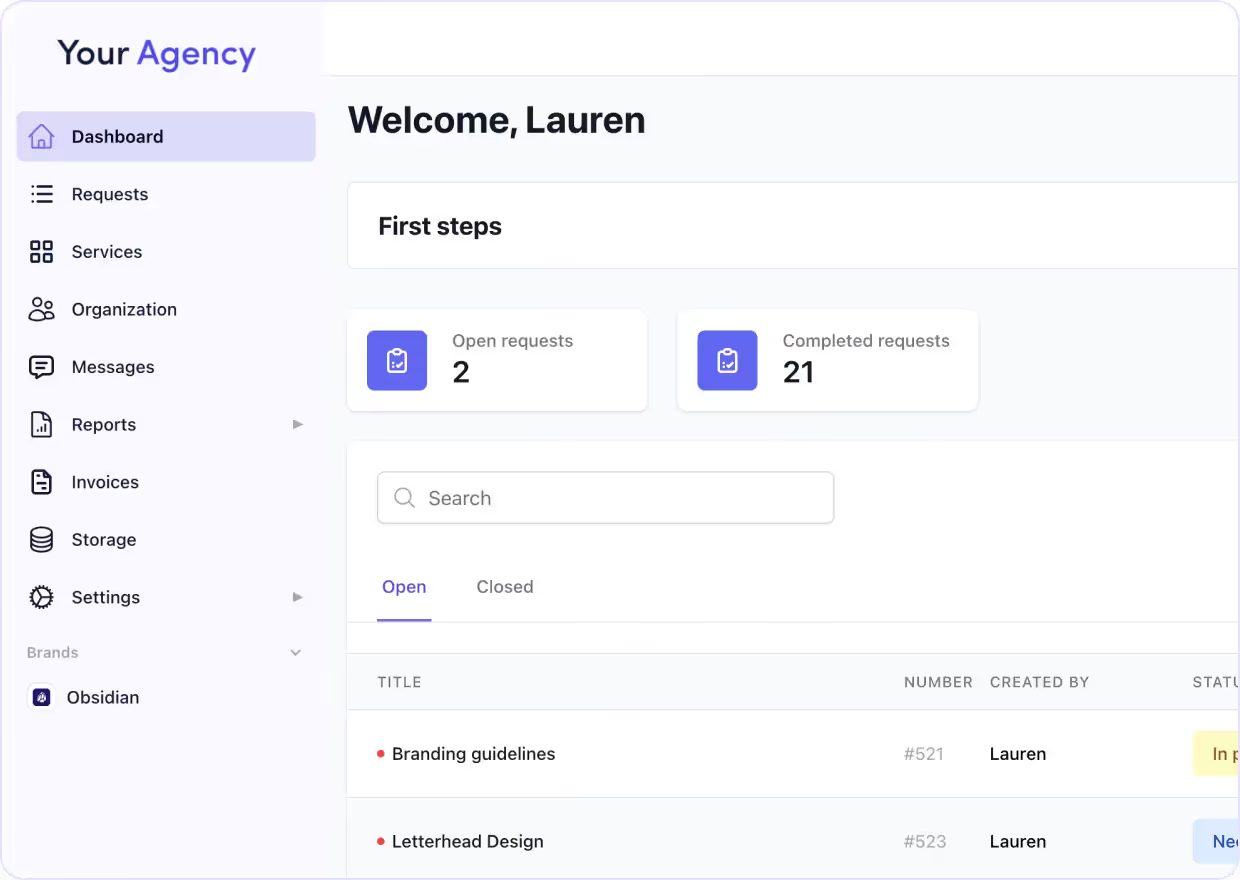
Pro Tip: Create a productized service. You can bundle an offer for social templates or a brand guide to increase the value of your offering.
Here, you'll write and manage weekly email or LinkedIn content for busy founders, consultants, creators.
For this to work, you must be an excellent writer with a clear voice. More than this, you must understand how to write persuasively and break down complex ideas into clear copy so the executive's audience “gets it.”
Why it’s worth considering: Executives want influence but some don’t have time to write consistently. You help them show up every week with minimal effort and get paid for it. In return, your content helps them achieve their goals.
How to get started: Pick a fictional executive, write a sample newsletter, and post it on LinkedIn or Substack.
You can then reach out to founders and offer a test trial. You can use ManyRequests for that; while designing your offer, there's an option for free trial (enable trial period):
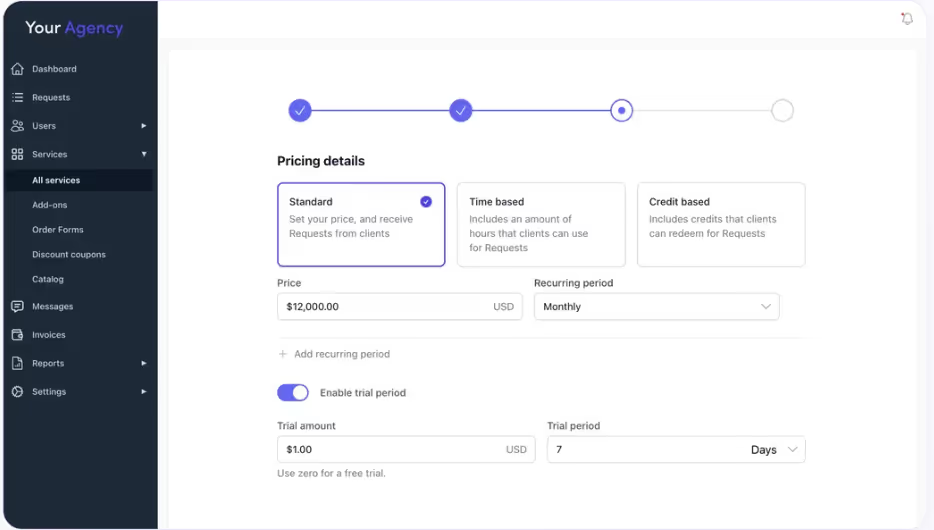
Aside from this, you may need scheduling software like Buffer and a Grammarly premium subscription to check for grammar mistakes.
Pro Tip: Use Zoom, Google Meet or voice notes to interview clients and extract their ideas on specific topics or recent news in the industry. Then repurpose those into weekly content on their walls.
Here, you'll evaluate websites or apps to find usability issues that affect conversions, then provide feedback as a report or video.
For this to work, you should have a background in product design, UI/UX, or at least be familiar with best practices and user behavior.
You can also read the book “Don't Make Me Think” by Steve King to expand your ideas about usability.
Why it’s worth considering: Founders want to improve their conversion rate but don’t always know what’s wrong. You offer fast, actionable insights without needing to build or code anything.
How to get started:
For this to work though, you must have built a decent following (or at least authority) on the social media outlet you use.
Pro Tip: Turn your audits into a video + PDF package with 3 sections: what’s working, what’s broken, and quick fixes. This can help your clients easily scan the problems and fix them.
For this business, you'll edit audio files, remove filler words, improve sound quality, and add intros, music, and show notes to episodes.
Who it’s for: You need audio editing skills and attention to detail. However, you can start with Descript and Audacity and improve quality as you continue.
Why it’s worth considering: Many podcasters quit due to post-production fatigue. Offering them a done-for-you editing solution to create recurring income.
That's exactly what Minuttia does. I hear them every time I listened to Content, Briefly, a podcast from Superpath:
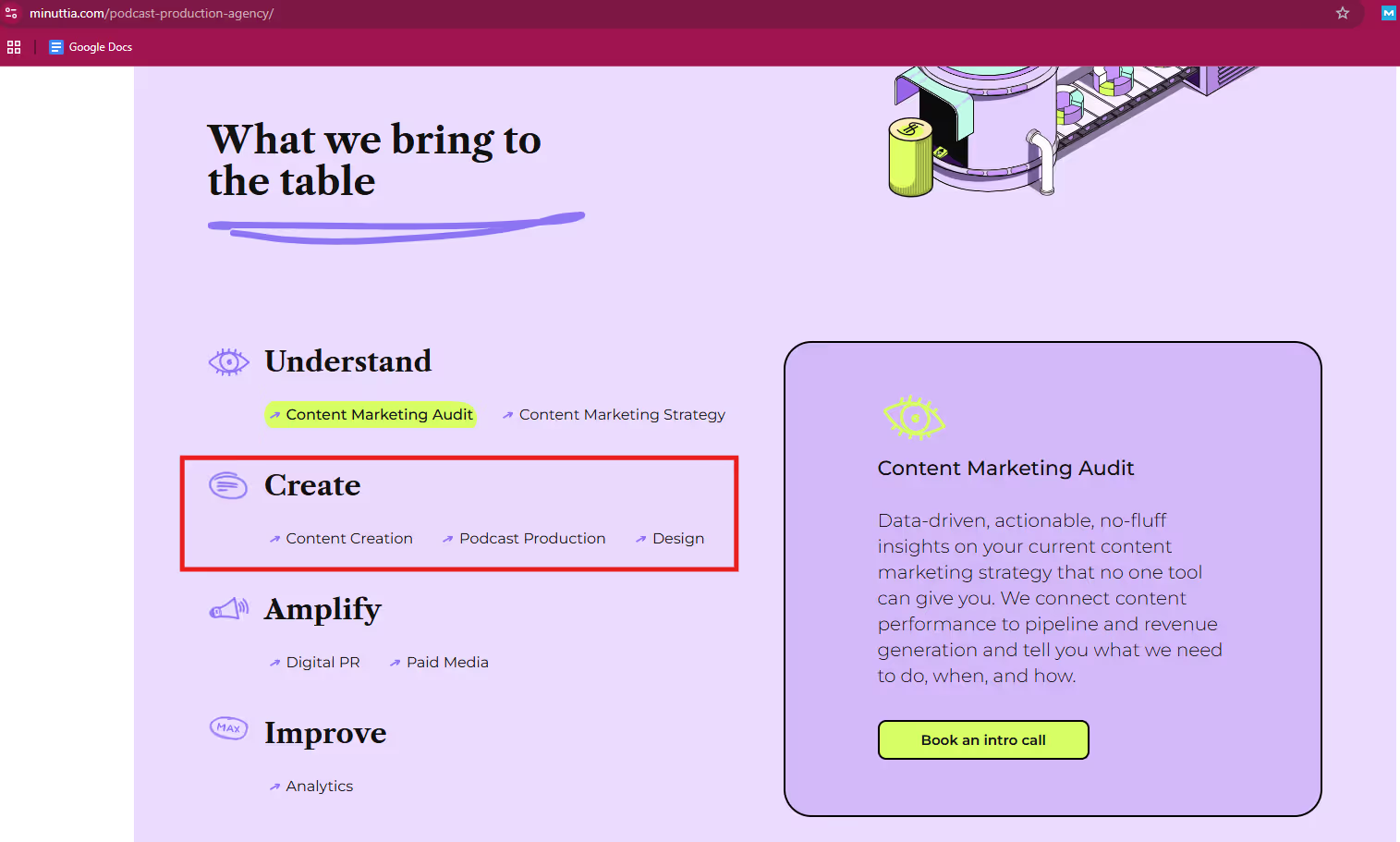
How to get started: Reach out to podcasters and offer to edit one free episode. Then upsell them into a 4-episode package.
You can then tell them to refer your business to their fellow podcasters. You can also advertise your podcast editing services on other content creator’s newsletters.
Pro Tip: Specialize in a niche (e.g., business podcasts, therapists, or parenting shows) so your workflow becomes repeatable.
In this business, you’ll write homepage copy, pricing pages, microcopy, and other website content businesses need. Your clients might include SaaS platforms, retail brands, or direct-to-consumer companies.
However, for this business to work, you must understand copywriting fundamentals (like AIDA, PAS) and have a full grasp of copywriting techniques from legends like David Ogilvy, Claude Hopkins, Gary Halbert, and others. Apparently, this is important, according to Tom Soulo, CMO at Ahrefs.
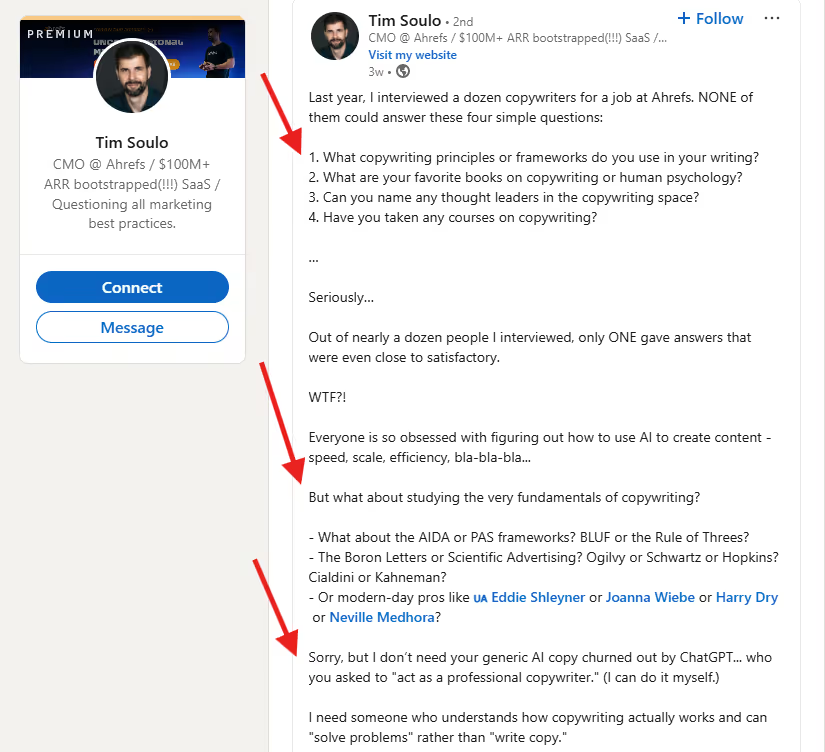
Why it’s worth considering: All businesses need high-converting copy to increase sales. If you help them get better results, you’ll be in demand.
How to get started: Rebuild the homepage copy of a business as a portfolio piece. You can use Figma to redesign it. Publish a teardown of what you changed and why, and reach out to founders whose websites may need an edit and show them what you can do.
Pro Tip: Create a productized offering: 1 homepage + 1 email sequence for a flat fee. It can help you work on two projects at once, avoid scope creep, and get recurring gigs.
Perfect for designers, writers, and service-based creatives looking to monetize their skills.
As a micro creative agency owner, you operate a small team or solo studio offering bundled creative services. This can be branding + copywriting or design + content marketing.
For example, Victor Eduoh founded VEC Studio, a product-led storytelling content agency.
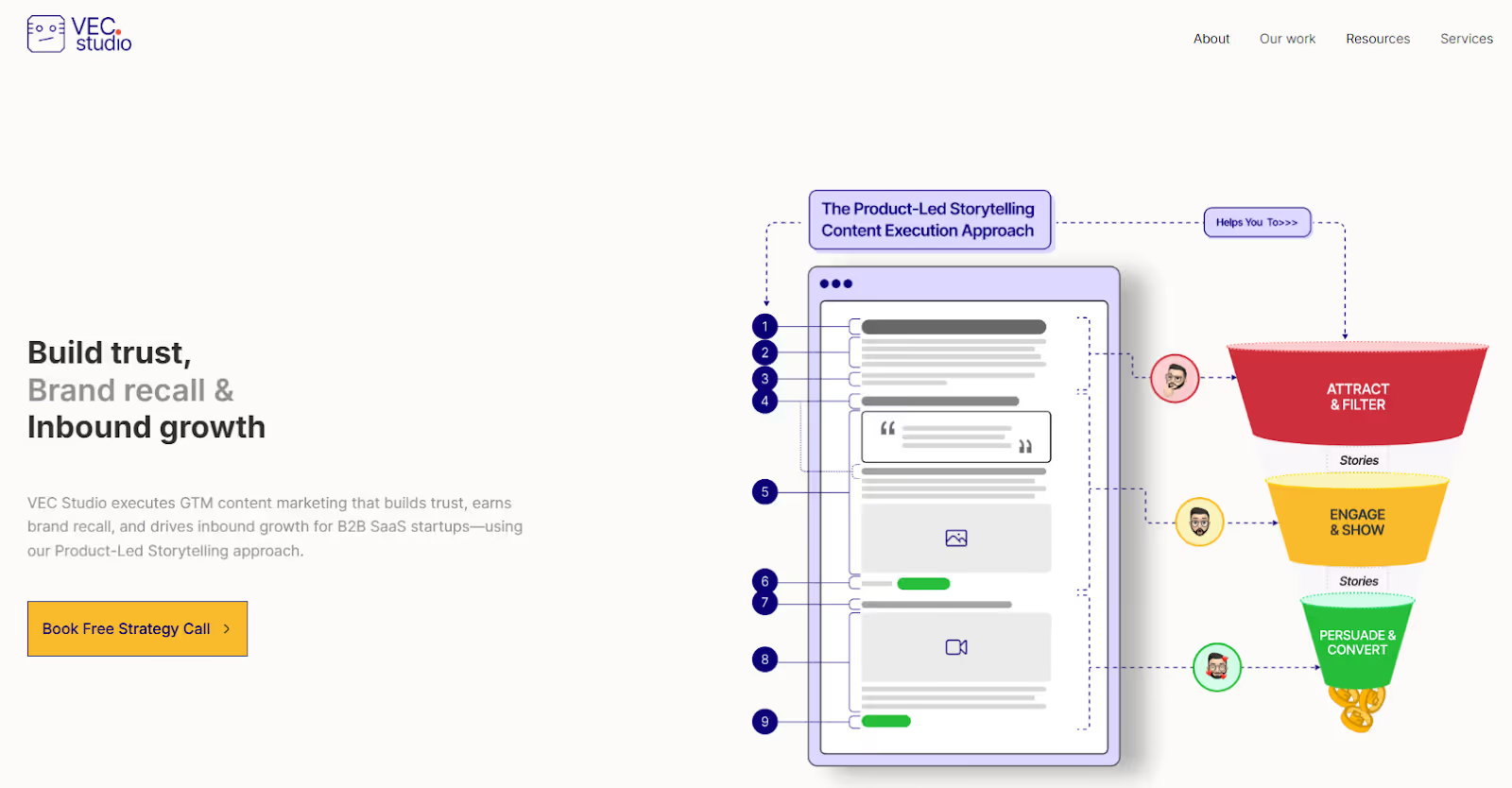
When he realized that the designs he wanted for his clients can't be created by typical design agencies, he founded Curt Studio, partnered with designers, and is now the strategic advisor of the company that does “B2B content marketing and landing pages designs.”

Who can do this business: Creatives with more than one skill or those who know how to partner with specialists. You should be comfortable managing multiple client touchpoints and tools.
Why it’s worth considering: Clients want streamlined delivery. If they can get design, copy, and content strategy from one place, they’ll pay more for the convenience.
It also creates recurring work for you. Those who work with you for one service may eventually switch to your agency for other services because it's easier to manage everything in one place.
How to get started: Decide what services you’ll offer and whether you’ll do it alone or partner with others. Build two bundled offers (e.g., Startup Pack, Rebrand Kit) and test pricing on cold outreach or Upwork.
Pro Tip: Productize your process and deliverables early. It can help you scale faster.
Here, you'll help businesses improve search visibility by auditing their websites for on-page and technical SEO (including broken links, keyword gaps, and content structure). You offer recommendations, not execution.
This business is for those who understand SEO fundamentals beyond the basics. You need to know technical & on-page SEO and have experience creating reliable content strategy for companies.
Why it’s worth considering: Many small businesses want SEO services but aren’t ready to commit to a monthly retainer. A one-off audit is a great entry point to see how SEO can scale their business. If they love the success, they can commit retainers.
How to get started: Run a free audit for a friend’s business or a startup. Turn it into a case study. Sell audit + strategy + 30-min consult for $499 or any other price point you feel comfortable with.
Pro Tip: Keep a checklist or template you use each time. This helps you create a quality benchmark and scale delivery.
In this business, you'll run Facebook and Google ad campaigns for small businesses, consultants, or online retailers. You handle setup, copy, targeting, and optimization, and clients pay you.
To do this, you need some experience running ad accounts, even if it’s your own. Copywriting and analytics skills are also useful.
Why it’s worth considering: Businesses know ads work but don’t have the time to learn how each platform works. It's also expensive for business owners who don't know how to optimize their ads better. You become their plug-and-play performance expert.
How to get started: Offer free ad audits. Then pitch a test campaign for $250–$500. Position yourself as a performance partner, not just a freelancer.
Pro Tip: Specialize in an industry (real estate, coaches, local shops) so you can reuse funnels, audiences, and creatives. Use ManyRequests as your CRM and client portal so you can chat with all clients, see their tasks, and get paid via Stripe through one software.
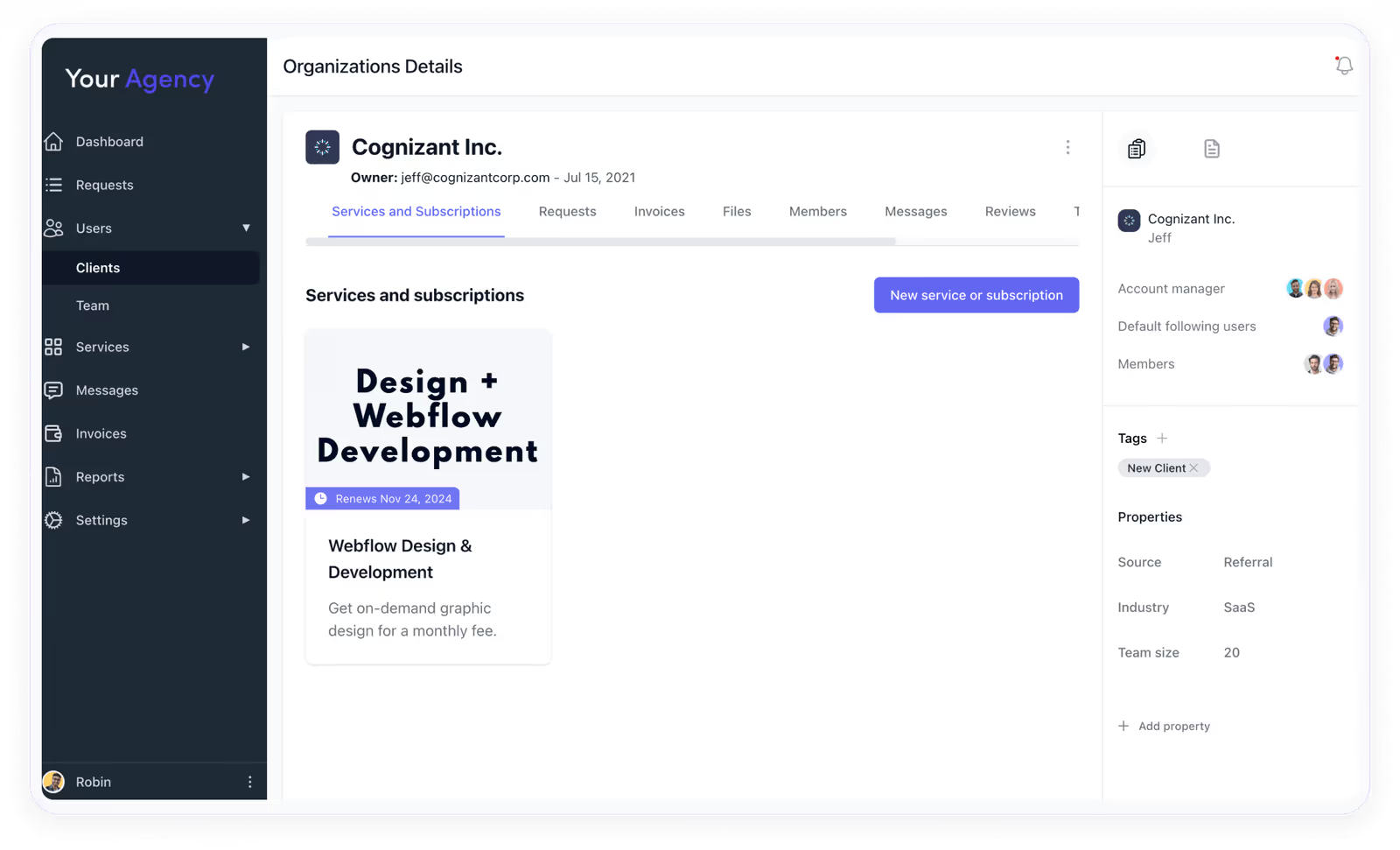
In this business, you'll sell ready-to-use market research reports or offer to research competitors, trends, and customer preferences for specific products. This can be especially useful for founders, agencies, and e-commerce brands launching new offers.
To do this, you should have a background in research, data analysis, or strategy.
If you’re already used to structuring insights in Notion, Airtable, or Google Sheets (and can communicate them clearly) you’re qualified.
Why it’s worth considering: Companies pay top dollar for market research. But they don’t want to deal with traditional research firms (McKinsey, Gallup, etc.) because they're expensive. You can make the process faster, cheaper, and easier to understand.
How to get started: Pick an industry you know. Create a 5-page sample report based on public data and offer it as a free resource in exchange for email addresses, social media shares, and an opportunity to upsell custom versions.
You can also use Notion to document and Typeform or Google Forms for surveys.
Pro Tip: Position your service for fast-moving founders—think “48-hour market snapshot for your next product launch.”
In this business, you'll help small businesses automate operations using tools like Zapier, Airtable, Make.com, and Notion. Think lead routing, invoice generation, client onboarding, or reporting flows.
For this to work, you need to be comfortable with workflows and API logic (even if you don’t code). It’s even better if you’ve built your own automations and can articulate why it is important to have these automated systems.
You can also use AI agents like Amos Bar-Joseph of Swan AI says he does.
Why it’s worth considering: Time-saving automations are in high demand, but most small teams have no idea how to build them. You become their behind-the-scenes systems operator.
How to get started: Document one killer automation with screenshots or Loom videos. Share it on Twitter or LinkedIn. Offer a $297 “automation tune-up” as a foot-in-the-door product.
In this business, you create and sell digital goods like Notion templates, pitch decks, Canva planners, Notion dashboards, or Figma wireframes. Products are one-time builds with unlimited resale potential.
This type of business is ideal for creatives or systems thinkers who know how to build helpful systems for specific purposes. However, you need basic design and marketing copy skills.
For example, Oluwaseun Akinlembola, a freelance writer, designed a Notion portfolio as a free template. He can monetize it and be paid for his efforts.
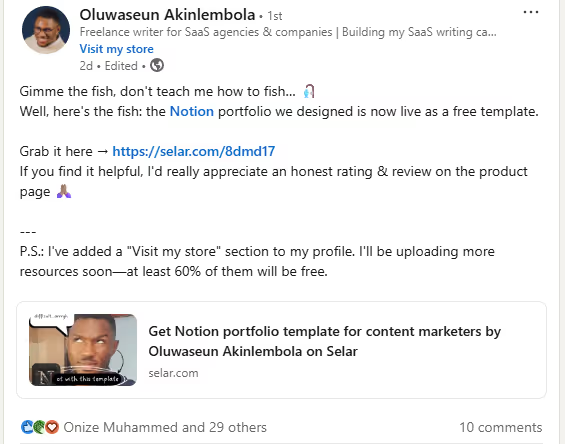
Why it’s worth considering: Digital products = infinite inventory. It’s one of the few online business models where you can earn passively with minimal overhead after the initial setup.
How to get started: Make one highly useful product and sell it for $29. Promote it via Twitter threads, LinkedIn, TikTok, or other niche forums.
Pro Tip: Stack products by audience type. E.g., a productivity template series for students, remote workers, or startup founders. It all depends on your niche and who you think would value your service/product the most. Then sell on Gumroad or a personal website.
Here, you'll run a niche newsletter and monetize it via paid subscriptions, affiliate links, or sponsorships. Common niches include investing, SaaS, creator economy, or career tips.
For example, here’s what a paid partnership is like from Superpath, a Slack community for content marketers that runs an active newsletter: they partnered with Brevo.
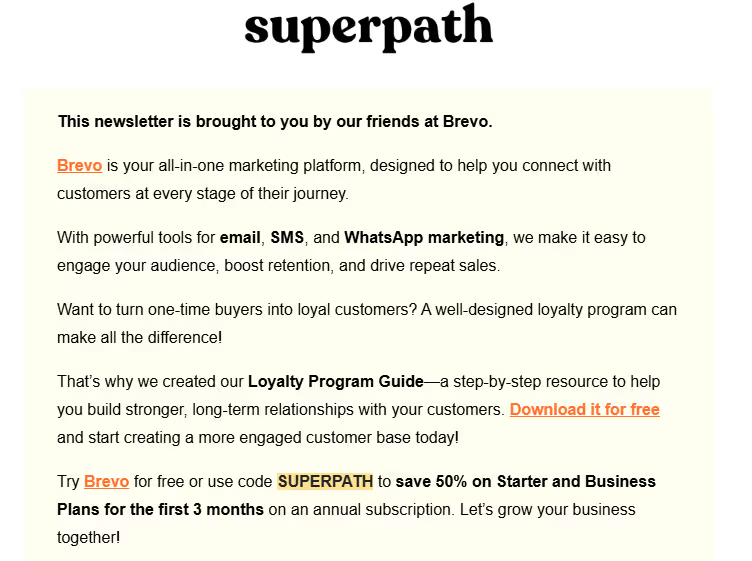
Here’s another paid newsletter from Lenny’s Newsletter:
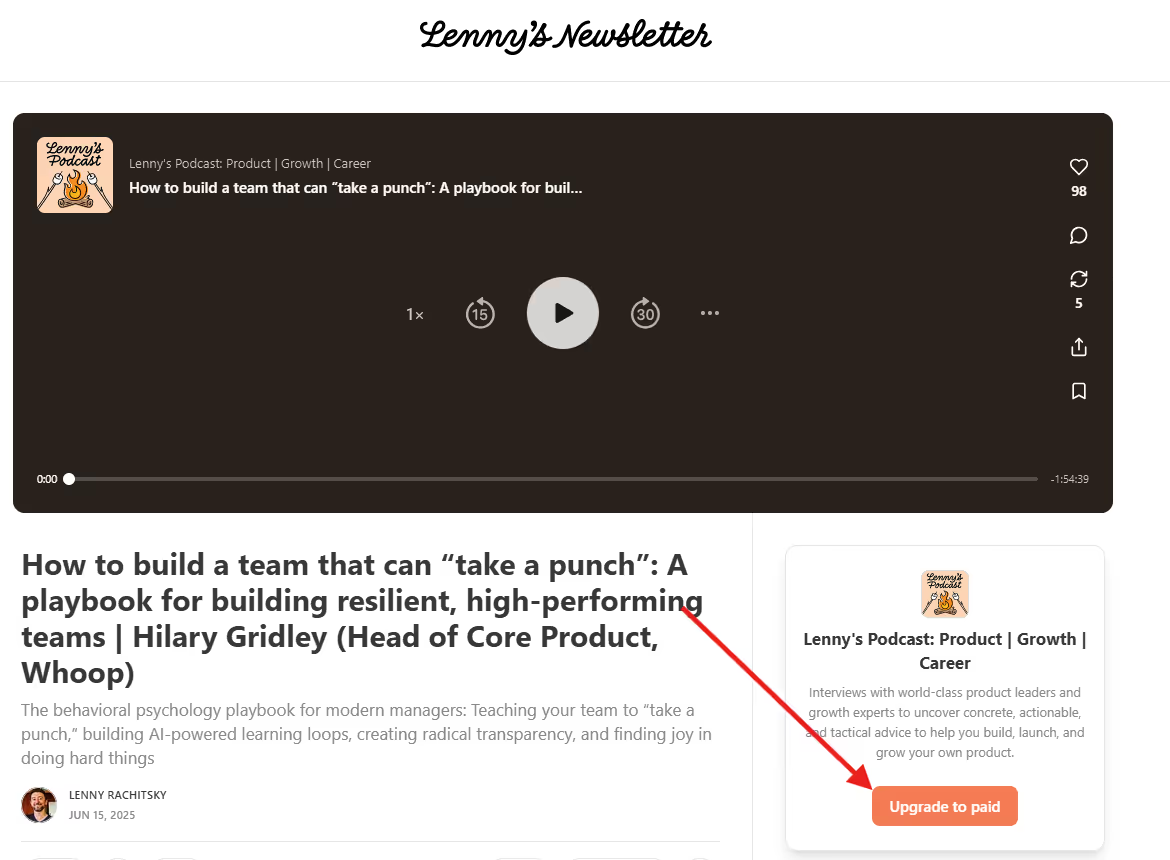
You would have to pay him on Substack to access full content.
So, who can do this kind of business?
Writers who have a point of view and can write consistently. You need at least intermediate writing ability and a desire to build long-term audience relationships. When it comes to newsletters, you need to build a community and engage them as regularly as possible.
Why it’s worth considering: Email is still one of the most reliable forms of monetization. With Substack, Beehiiv, and ConvertKit, the barrier to entry is extremely low. And if you have ideas worth paying for, you should be paid for them.
How to get started: Choose a niche you know well. Write 5 issues upfront and publish weekly. Promote via X/Twitter and LinkedIn, and open a free-to-paid tier once you get traction.
In this business, you'll create a short, topic-focused video course teaching a skill—like “how to run LinkedIn ads” or “intro to Figma for freelancers.” These are short-form (1–3 hours, or more) but dense and practical.
Here's an example of an editing course from Erica Schneider, an editor turned entrepreneur.
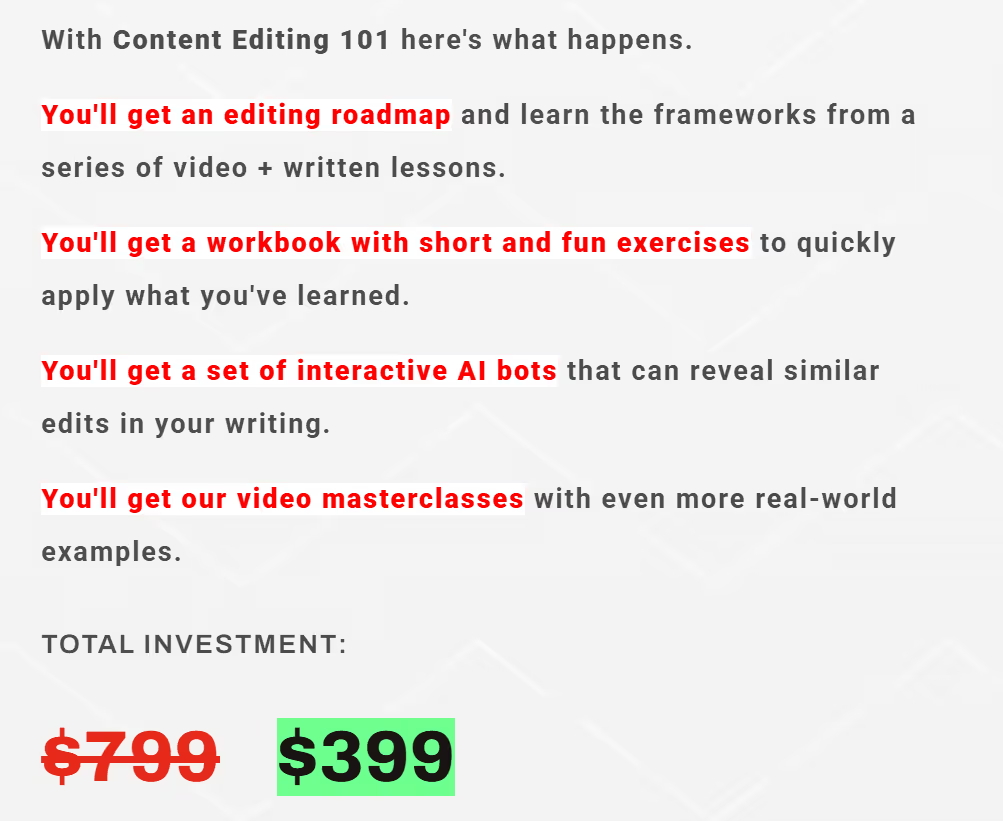
Here’s another example from Ryan Law, Director of Content at Ahrefs. His course on how to write thought leadership content has been available for over two years, and is for sale at $199.

This means that even if 5 people buy the course every month (whenever he pushes the courses), that’s $1,000 in passive income without lifting a finger.
So, who can do this business?
Educators, consultants, or specialists— anyone with deep knowledge in a niche topic. You must also be comfortable on camera, recording voiceovers, and writing persuasive copy to sell your course.
Why it’s worth considering: Micro-courses are easier to sell, easier to complete, and don’t require months of preparation. With platforms like Podia or Lemon Squeezy, you can also distribute it easily.
How to get started: Outline your course, script short lessons, and record with Loom or OBS on your PC. Launch with a 20–30% discount to get early sales and testimonials.
Pro Tip: Pair your course with templates or bonus content. This increases its perceived value and encourages referrals.
This is a business for illustrators, designers or marketers with an eye for trends.
In this business, you'll design graphics or sayings and sell them as merchandise, like t-shirts, hoodies, mugs, or posters, on platforms like Printful, Printify, Redbubble or even Instagram and TikTok shops.
For this business, you'll need basic design and copy skills, plus some patience for testing what sells.
Why it’s worth considering: There’s no upfront inventory if you're using platforms like Printful, Printify, or Redbubble. They handle inventory, so you'd only print and ship any merchandise on demand.
You profit from the margin.
But if you intend to sell on Instagram or TikTok, you'll handle inventory, marketing, etc., but you'll get better profit margins. Here's an example of an illustrator selling his designs on Instagram:

How to get started: Choose a niche (e.g., fitness, sarcasm, dog lovers). Create 5–10 designs. List them on Instagram, Etsy or Shopify and promote them on TikTok or Pinterest. Anywhere you believe your target audience are— even on your WhatsApp status stories.
Encourage your friends to repost to help you build traction.
Pro Tip: Use trending phrases, micro-niche humor, or seasonal events to stand out in search.
In this business, you build lightweight, custom CRM systems for freelancers, solopreneurs, or small agencies using tools like Notion or Airtable. These CRMs help users track clients, invoices, deliverables, and tasks without HubSpot or Salesforce.
This type of business is ideal for people who love systems, automation, and no-code tools. You should also be good at organizing workflows and understanding how service-based businesses operate.
Why it’s worth considering: Most solo professionals know they need a CRM but hate complicated tools. If you can build a sleek, easy-to-use system in Notion or Airtable, there’s a market ready for it.
You just need to show up on their screen (through aggressive marketing or writing consistently on LinkedIn).
How to get started: Build a demo CRM for a fictional agency. Record a walkthrough. Share it on LinkedIn or Twitter with a call-to-action like “DM me to build yours.” Offer setup for $249–$499 depending on complexity.
If you can, you can guest post on any industry website to get visibility.
Pro Tip: Productize this type of business. You build for one day (or weeks), test if it has merit using a few pilot companies, and set a fixed pricing. What you get is a scalable business that can keep paying you without actively marketing it.
These are businesses that require you to interact with people physically. They're great for solo operators or those who want to serve their immediate community.
Here, you provide professional car cleaning and detailing at people’s homes or workplaces (interior, exterior, waxing, polishing, etc.).
This is for people who enjoy hands-on work and have good attention to detail. However, you'll need a reliable vehicle to move around, great customer service skills so your customers can love and refer your business to others, and you need to be punctual.
Why it’s worth considering: Demand is high in urban areas and affluent neighborhoods. You save clients time, which they’re happy to pay for.
How to get started: Offer discounted services to your first few clients in exchange for reviews and photos. Post results on social media and your Google Business Profile. Also, optimize your Google Business Profile with relevant keywords so people can find your service easily.
Pro Tip: Offer packages (e.g., basic clean vs. full detail) and upsells like ceramic coating or pet hair removal.
In this business, you offer photography services for a niche. It can be real estate, food, nature, product photography, portraits, or events. Clients book you for sessions or deliverables.
This business is for creative individuals with a good eye for perfect angles. You understand how to use cameras. You must have either received professional training or have trained yourself through YouTube (like many people do).
Why it’s worth considering: Quality photography is always in demand. While people can use their smartphones, they need photographers to capture moments that matter (for their events).
They also need high quality photos to sell their business (think real estate, local restaurants, creators, and influencers). They need fresh visual content regularly, and mobile photography isn't always the best.
So, if you have a knack for great angles for photos and videos, you can make this your business.
How to get started: Offer discounted or free shoots for a few local businesses (or any other target audience). Use the results to build your site and social proof.
In this business, you rent out decor items like arches, lights, centerpieces, backdrops, or table setups for weddings, birthdays, and corporate events.
This business is for creative, resourceful individuals who love design and have storage space to keep all items. You also need good customer service and must be reliable.
Why it’s worth considering: People are willing to pay more for aesthetics and convenience. While your costs are upfront, items can be reused for years.
How to get started: Start with one signature package (e.g., “Rustic Wedding Setup”) and take high-quality photos of it. Promote on Instagram and local event directories, and leave your number when you can so people can call you.
Pro Tip: Partner with venues and wedding planners for referrals and package deals.
In this business, you help creators or coaches package their expertise into a sellable course or ebook funnel. You'll set up their landing page, payment flow, email sequence, and scheduling links.
This type of business is great for people with digital marketing experience, a knack for conversion flows, and an understanding of tools like Framer, Gumroad, ConvertKit, or TidyCal.
Why it’s worth considering: There are millions of creators and micro-consultants trying to monetize their expertise but are stuck with tech. Now, they can focus on content while you handle the “boring backend.”
How to get started: Build a fictional creator funnel as a demo. Post the before/after online. DM 10 creators and offer to set up their system for $499 (or less/or more).
Pro Tip: Specialize in a niche (fitness coaches, YouTubers, parenting bloggers) so you can streamline your templates and stack referrals.
In this business, you rewrite resumes and LinkedIn profiles for job seekers to help them stand out to recruiters and hiring managers.
This is for writers, career coaches, or former recruiters who know what each role people typically apply for (and can help each applicant's land sort after roles). For this to work, you need strong copywriting skills and a good understanding of hiring trends.
Why it’s worth considering: Job seekers need help packaging their experience. It’s emotionally high-stakes for them and easy to standardize for you because you know what a recruiter wants to see and how to properly phrase it.
How to get started: Rewrite your own resume and use it as a sample. Then offer 3–5 resume reviews at a discount in exchange for testimonials. You can also write for friends (or colleagues looking to step up at work) at a discount price, and use their reviews and testimonials as social proof.
Pro Tip: Bundle resume, cover letter, and LinkedIn refresh as a single productized offer. This way, each client will get a complete overhaul of their digital presence and it can increase their chances of getting that new job.
These are additional business ideas under $5K that require minimal infrastructure and are great for solo operators.
Offer admin, scheduling, inbox, or content support to busy professionals. This is ideal for organized individuals, but you can scale this business by building a VA agency.
Run content calendars, engagement, and schedule posts for creators or small brands. This is a strong fit for social media natives; who know the right things to write to increase engagement and help brands achieve their goals.
Record voice overs for YouTube videos, ads, or audiobooks using basic equipment and editing tools. This is ideal for people with a sound accent.
Help creators, marketers, or businesses build better prompts and workflows for ChatGPT or other AI tools. It's in fast-growing demand.
Edit TikToks, Reels, or Shorts. This is great for editors who understand viral hooks and can work fast. It has a high retention rate and you can get recurring contracts from each client.
You can make this process easy if you build in public. It helps you get feedback for your idea, visibility for your business, and your first few clients.
Yes. Most service-based and online businesses require time, tools, and positioning, not a massive capital investment. $5K is enough to launch and test a lean MVP.
Creative service businesses with productized offers (like design, writing, and digital strategy) are the easiest to launch, automate, and scale. All you need is strong knowledge of the market so you can penetrate conveniently.
With clear positioning and the right tools, many service-based businesses can see ROI within 60–90 days, especially if you use a client portal like ManyRequests to organize your business.
Starting a business with $5K in 2025 is possible and smart. All you need to do is to focus on client problems, maintain a lean operation, and find (and use) tools that save you time.
Need help streamlining your services? Use ManyRequests to manage client onboarding, intake forms, deliverables, invoices, and payments all in one place.
So, pick one idea. Plan your budget. Launch. Iterate. Your future business is closer than you think.